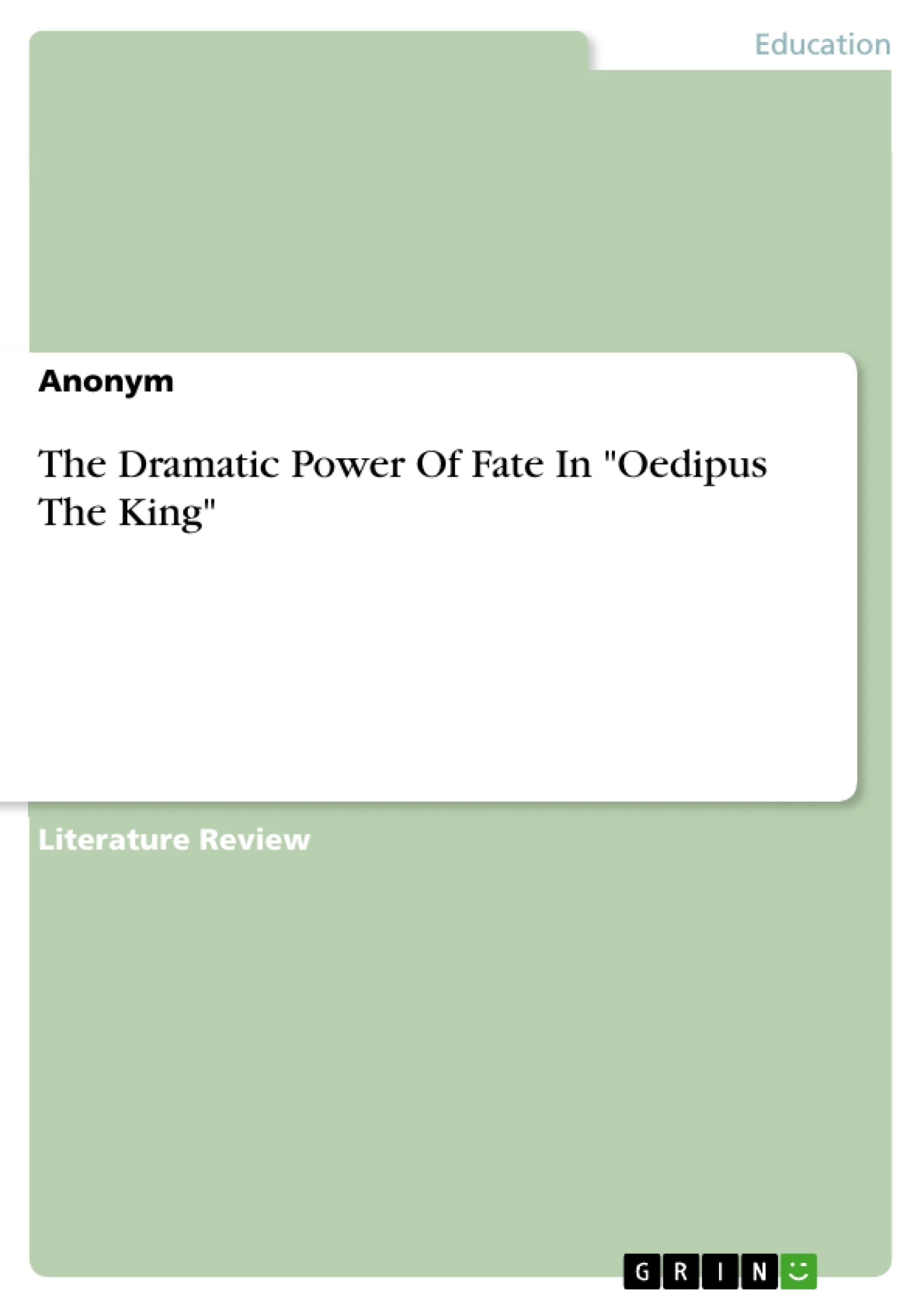Over the centuries, people have believed in the influence of divine or diabolical power in their lives. One of the most often discussed themes of ancient Greek tragedy is fatalism, the idea and belief that human actions are guided by the hand of fate, destiny, the gods or some other supernatural forces. The ancient Greeks recognized the role of fate and for them it represented a terrifying unstoppable force. Fates was the will of the gods, and unopposable reality. In the play Oedipus The King (425 B.C.) by Sophocles (496-406 B.C.), Oedipus is a perfect tragic hero, victim of his fate. As the play starts, the citizens of Thebes beg their king, Oedipus, to lift the plague that threatens to destroy the city. Creon, Oedipus’s brother in law, announces that the oracle instructs them to find the murderer of Laius who was king of Thebes before Oedipus. Only this will end the plague. A blind prophet, Tiresias, accuses Oedipus of killing Laius. Angry, Oedipus orders him to leave. Jocasta, the queen, encourages him to ignore prophecies. However, Oedipus is anxious because just before he came to Thebes he killed a man who looked like Laius at a crossroads. Another worry haunts Oedipus: as a young man, he learned from an oracle that he was fated to kill his father and marry his mother. Then, Oedipus becomes determined to find out the truth of his birth. Finally, a shepherd reveals that Oedipus is the son of Laius and Jocasta. The prophecy has come true; Oedipus is devastated by his fate. Later, he finds that Jocasta killed herself. Oedipus is suffering so much that he blinds himself so he will no longer look upon the misery he has caused. In the play, it is the element of fate that leads ultimately to the tragic downfall of the characters.
Table of Contents
- The Dramatic Power Of Fate In Oedipus The King
- Tiresias: The Symbol of Fate
- Jocasta: The Most Immediate Victim of Oedipus’ Fate
- Oedipus: The Most Obvious Victim of Fate
- The Climax of the Play
- The God's Predictions
- The Tragic Downfall of the Characters
Objectives and Key Themes
The play "Oedipus The King" explores the concept of fate and its influence on human actions and suffering. It analyzes how individuals grapple with predetermined destinies and the role of free will in the face of powerful forces beyond their control.
- The power of fate and destiny in shaping human lives
- The role of prophecy and its impact on individual choices
- The nature of truth and the struggle to understand one's identity
- The consequences of ignorance and the tragic nature of human existence
- The relationship between free will and predetermined events
Chapter Summaries
- The Dramatic Power Of Fate In Oedipus The King: This chapter introduces the central theme of the play - fatalism, the belief that human actions are guided by fate. It outlines how the ancient Greeks perceived fate as an unstoppable force, highlighting the example of Oedipus as a tragic hero who falls victim to his destiny.
- Tiresias: The Symbol of Fate: This chapter examines the role of Tiresias, the blind prophet, as a representative of fate. Tiresias' ability to see the future contrasts with Oedipus' blindness to his own past and present, highlighting the power of prophecy and the consequences of rejecting the truth.
- Jocasta: The Most Immediate Victim of Oedipus’ Fate: This chapter explores the character of Jocasta, Oedipus' mother and wife, as a victim of fate. Jocasta's distrust of oracles and her belief in the unpredictability of chance lead her to a tragic end, demonstrating the inescapable power of destiny.
- Oedipus: The Most Obvious Victim of Fate: This chapter focuses on Oedipus as the most evident victim of fate. His ironic ignorance and determination to uncover the truth of his birth lead him directly into the hands of destiny, highlighting the consequences of his actions and the inescapable nature of his predetermined path.
- The Climax of the Play: This chapter examines the climax of the play, where Oedipus confronts the shepherd who reveals the truth of his birth. This revelation leads to a deep sense of suffering and self-discovery, culminating in Oedipus' realization of his own responsibility for his tragic fate.
- The God's Predictions: This chapter explores the role of divine predictions in shaping the actions and suffering of Oedipus. The predictions made to Laius and Oedipus influence their choices and lead to a series of events that culminate in Oedipus' downfall, highlighting the influence of fate and the consequences of trying to avoid one's destiny.
Keywords
The play "Oedipus The King" focuses on the concepts of fate, prophecy, free will, ignorance, identity, and the tragic nature of human existence. It explores how these concepts interact to shape individual choices and ultimately lead to the tragic downfall of the characters.
- Quote paper
- Anonym (Author), 2015, The Dramatic Power Of Fate In "Oedipus The King", Munich, GRIN Verlag, https://www.grin.com/document/993555




